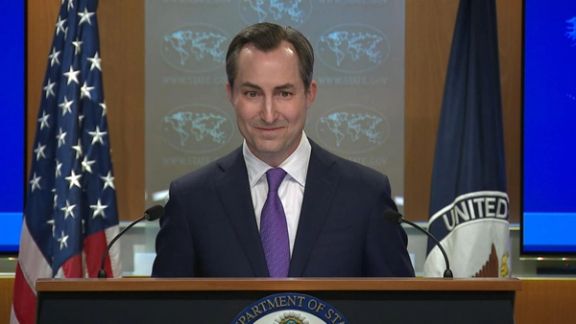State Department Tries To Brush Aside Report On Iranian Infiltration

Reactions to Iran International’s report revealing a Tehran-linked network of individuals influencing US officials are bubbling up with calls for accountability.

Reactions to Iran International’s report revealing a Tehran-linked network of individuals influencing US officials are bubbling up with calls for accountability.
During a press briefing on Tuesday, US Department of State Spokesman Matthew Miller tried to reduce the problem to only one of the aides of Robert Malley, President Joe Biden's former special envoy for Iran. Malley has been put on unpaid leave since June and his security credentials suspended in an investigation not yet fully explained.
"From my reading of it (the report), it looked like an account of things that happened almost a decade ago, most of which involve people that are not currently working for the government,” he said, tacitly acknowledging the existence of an Iranian lobby in US policy centers.
“The one current US government official that I did see mentioned in that story has written critically of Iran on a number of occasions before joining the government," Miller said without naming her. Ariane Tabatabai is a senior policy advisor to the Department of Defense.
In a joint investigative project with Semafor, Iran International’s Bozorgmehr Sharafedin combed through thousands of emails from Iranian diplomats revealing an Islamic Republic network of academics and journalists – under the aegis of the Iran Experts Initiative (IEI) -- established by the Iranian foreign ministry in 2014 to extend Tehran's soft power. The IEI members simultaneously worked for top Western think tanks and gave advice to the US and Europe. At least three aides of Robert Malley were part of the esoteric clan.
Miller added that she “underwent a thorough background investigation to attain a security clearance before joining the State Department. She now works at the defense department.”
Asked if the revelations in the report were related to the current FBI investigation of Malley, Miller said, “I am reluctant to say anything at all about the investigation.”
In response to a question about how he would explain that these individuals were seeking directions and advice directly from Tehran to influence the US government, Miller said he does not know the context and repeated the same line that “This happened almost a decade ago.”
Daniel Roth from the United Against Nuclear Iran group said on X that “Miller doesn't 'know the entire context' but is confident there's nothing to see here,” pointing to revelations in the detailed report.
Another UANI fellow Jason Brodsky said that “dismissing the story due to the time period in question and the fact that some do not work in the US government is an inadequate response.” “Some who do not hold USG jobs and don't have security clearances are regularly quoted in media as being briefed on ongoing negotiations with Iran's regime," he underlined.
Andrew Ghalili, with the National Union for Democracy in Iran, called Miller’s response “irresponsible,” and called for clarification after some investigations.
Just hours after the publication of the report, the Chairs of the House Armed Services Committee Mike Rogers (R-AL) and its Subcommittee on Intelligence (R-MI) wrote to US Secretary of Defense Lloyd Austin demanding answers on why DoD’s Chief of Staff for Special Operations was a part of the Iranian FM’s “Iran Experts Initiative”.
Later on Tuesday, Senator Ted Cruz (R-TX) released a statement, calling for a halt to secret negotiations with Iran seeing the investigative report. “These reports and the emails they expose are indescribably troubling,” adding that “They have agreed to secret nuclear side deals that are being kept from Congress, including ransom deals worth additional billions of dollars,” he said.